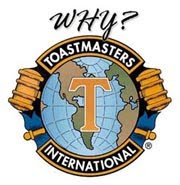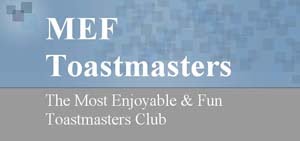Chia Lih is a speaker who is well-versed in speaking impromptu. For me, he is such a quick-witted speaker who can effortlessly overcome any possible questions and topics thrown to him. That’s why we think he is the most ideal person to impart some tips on this topic. I am sure for those who know him well will also give a resounding vote of consent towards my statement.

The Toastmaster of the Evening, Narchonai (standing) in action.

Distinguished Toastmaster, Charles Tan Chia Lih presented with full of vivid body language

Fellowship session during the breaktime.

See, Chia Lih did not want to miss any chance to be captured in the camera. He was sitting there properly and threw his gracious smile to make sure he looks presentable in the camera shot.
Chia Lih didn’t directly channel us into the topic of Q and A session. Instead, he shared with us on how to analyze different types of audience or customers we may probably encounter when making a sales or delivering a presentation. I think his sharing on this point is rather crucial before we can effectively answer the questions of the audience. Yes, we need to understand our audience first. According to him, there are four major types of audience or customers, typically the high dominance group, high influence group, high steadiness group and high compliance group.
High dominance people are goal-focused. Those people require concise and direct talk and visuals without unnecessary delay. They want your speaking pace to be brisk but not rushed. If you incline to dragging your contents, this kind of person will most likely lose their interest listening to you. If you wish to successfully deal with this type of characters, tell them what are the tangible benefits will they gain after listening to you at the outset of your presentation in a succinct way.
If you want to please the high influence people, you must be able to master the skill of building rapport. Those people like to share anecdotes & experiences. If you would like to click with them, you need to be at the same ‘channel’ with them. Talk about things they like to hear first before sharing what you want them to hear from you. Those people are very lively, so your pace of communication has to be as vibrant as possible to sustain the momentum. They will be intrigued easily with more colourful presentation visuals.
According to Chia Lih, high steadiness people are more receptive to facts and clear explanatory. Due to this reason, you definitely need to prepare handouts and full transcript of your talk for them. Your speaking pace should be steady and do not simply overstate benefits as you will probably lose your credibility. Shortly speaking, you have to be sincere in your speech.
If you are an analytical, precise and detailed person, high compliance people are your most ideal customers. Those people will prefer you to have plenty of facts and supporting information in your presentation before they make any decision. Before meeting this type of customers, you need to be prepared for a series of possible questions to add odds of sales success into your favor, as they will normally ask very detailed questions. These kind of people may not merely want to know ‘1+1=2’, they may want to explore is there any other possible answer for ‘1+1’.
During the presentation, Chia Lih was being asked whom does he think is the hardest group to confront with. In his personal opinion, he claimed the high influence people are the toughest group to tackle as these people are normally nice to everyone. You may find it hard to capture their real buying intention on your idea or product.
After that, Chia Lih slowly moved to the topic of ‘question and answer session’. During this session, he conveyed to us a few beneficial tips. For example, demonstrate positive and assertive body language when inviting questions, like raising your hand.
He did advise us to answer the question from one person at a time. It is advisable not to answer few questions from different people simultaneously as you may obscure the answer and trigger some unnecessary contentious issues on the spot.
Do not shy to clarify the questions if needed. Raising clarification will be better than you answer the question wrongly which may highly tarnish your credibility. It is rather important to allow all the audience to hear the question posed. So you may look to someone else in the audience and rephrase the question, then return to the questioner and provide a concise answer.
There were five ‘taboos’ of handling question and answer session. Firstly, do not bluff. If you really have no idea about the question, tell the questioner frankly and promise to get back to him or her as soon as possible. Do get rid of bragging as if you know about the question, because you may get bogged down in the mid of your answer if somebody who knows the answer better stands up and disapproves your answer. You definitely want to avoid such a blooper right?
Secondly, do not ever embarrass the questioner. Even though you think the question raised is due to the questioner’s ignorance. You should not let the questioner feeling inferior by saying something like “I am surprised you ask such a simple question.”
Thirdly, remember not to rush to an answer or speak too quickly in order to ensure all the audience capture your message.
Fourthly, never appear to be defensive. For instance, when the questioner told you that you have answered a question too abruptly, you are not encouraged to repudiate the questioner’s statement like “No, I don’t think I answered your questions too abruptly. I did….”
Lastly, do not bore your audience or potential customers by giving long and elaborate answers. Not all the audience would like to know the detailed answer. If there is only one particular audience wants to know the thorough answer, you may deal with this person after the presentation.
All the members and guests who attended this educational session did provide a lot of positive comments on the topic shared. The good news is, Fennie, who was our guest during the last meeting, has turned into our member during this meeting. My colleague, Ms Hoo, who attended this meeting as a guest, also promises to sign up as a toastmaster. For those who have missed the precious moments of this sharing by distinguished toasmaster, Tan Chia Lih, hope this blog will provide you inkling about this topic.







